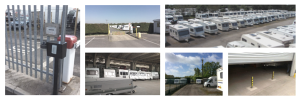What is a motor
mover?
A motor mover is a manual or 12V motorised device which is
clamped to a caravan chassis and connects to rollers attached to the caravan
wheels which then propel the caravan in any chosen
direction, controlled by a
handset.
Motor movers are powered by the caravan’s battery and are
available with different power motors depending on the weight of the caravan.
Why use a motor
mover?
Caravan motor movers allow you to easily manoeuvre a caravan
into position, whether that be into a driveway, storage or touring pitch, or
even hitching up. If you can’t or don’t want to push or pull your caravan in a
space using your car, a motor mover will move the caravan into position.
Motor movers also allow you to move a caravan towards the
car when hitching up, as well as helping to precisely align a wheel lock
receptor to simplify inserting a wheel lock barrel.
Whilst caravan motor movers can’t be described as an
essential piece of equipment, they can make life a lot easier – they can save
you having to rely on precision-manoeuvring with your car, struggling to
manhandle the caravan, and needing the guidance of another person. For tight
spaces and heavier caravans they’re especially useful.
What to consider:
- As a general rule you can expect to pay around £1000 for a motor mover depending on the make. Less expensive devices may have a less powerful motor, which may be reflected in performance if using in wet or cold condition.
- The mover you choose will depend on the weight of your caravan and whether it is single-axle or twin-axle. Each motor mover will detail the working loads they can handle. If you expect to have to move your caravan up a steep incline you’ll need a motor mover with capacity to do that.
- The weight of a motor mover needs to be subtracted from the payload of the caravan, so you need to be conscious of your payload allowance if using a motor mover. Find out more about caravan towing weights.
- Motor movers are either manual or motorised. Manual devices use a hand operated lever whilst motorised have 12-volt motors which move the mover’s rollers to make contact with the tyre. Electrical motor movers have the advantage of not requiring any manual effort, though are generally more expensive. Remember to find out how the motor mover works if the motor fails.
- Most motorised motor movers will require a well-charged 85Ah battery to operate.
- To avoid interference with the functioning of the spare wheel carrier or jacking brackets, a motor mover should be positioned in front of the axle. Getting the motor mover is fitted by a professional will avoid any problems.
Remember to read and follow manufacturer’s instructions and
perform regular maintenance checks.







 CaSSOA offers three levels of accreditation for storage site owners; Bronze, Silver and Gold, with awards based on a number of factors including security features and on-site facilities. Accreditation is based on a mandatory survey which is required every 5 years to ensure that standards are being maintained.
CaSSOA offers three levels of accreditation for storage site owners; Bronze, Silver and Gold, with awards based on a number of factors including security features and on-site facilities. Accreditation is based on a mandatory survey which is required every 5 years to ensure that standards are being maintained.


